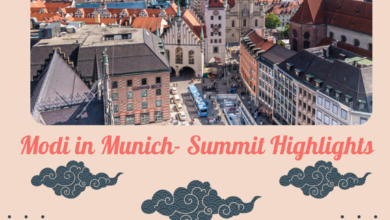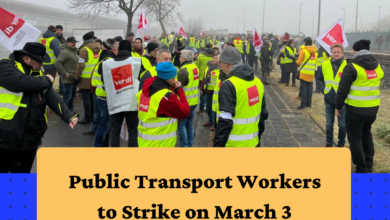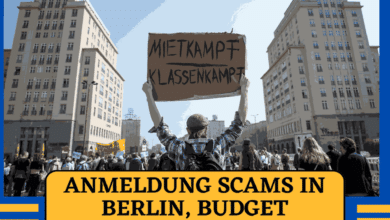Another Public Transport Strike; This One Mega in Size
Another Public Transport Strike; This One Mega in Size
Flights, trains, metros, ports, buses- the public transport in Germany halts operations for a 24-hour strike. The strike that began shortly after midnight on 27th March is one of the biggest walkouts in decades.
Workers in the Ver.di and EVG trade unions are demanding higher pay amidst inflation. The two unions joined forces to increase the impact of their cause.
Caught in the crossfire are hundreds of thousands of airplane and railway passengers who are unable to get to their destinations. EVG said that more than 30,000 railway workers have joined the strike.
The transportation of cargo is also affected by the dock workers joining the strike. The local trams and buses are also not spared and commuters are driving to work, causing further disruptions on the roads. Highway employees have too joined the fold.
It is due to such a massive impact that the locals are calling it a ‘mega-strike.’
Why are Workers on Strike?
Germany has high inflation right now. In February last month, it was 8.7%. This is a result of Russia’s invasion of Ukraine and Germany’s cut-off from the Russian fuel reserves as it took a stand in Ukraine’s support.
The Demands in Full
The trade union Ver.di is demanding a 10.5% rise or €500 per month for 12 months in the negotiations for the roughly 2.5 million workers in the municipal and federal public transport sectors. The EVG meanwhile wants a 12% salary hike or €650 per month for the 230,000 railway workers of the state-owned Deutsche Bahn and workers of bus companies it represents.
The employers have so far refused the demands and any offers they made were declined.
EVG and Ver.di have organized this strike to coincide with the third round of talks with the government and the employers.
Chief of Ver.di, Frank Werneke, has described the demands as a matter of survival for many thousands of employees. He said that the workers are not only underpaid but they are also overworked. They have to apply for government benefits just to pay rent.
Local Transport
Seven states are hit by the walkout of local transit employees. Commuters taking shorter journeys through local buses and rails and trams have close to no functionality in the Baden-Württemberg, Bavaria, Hesse, Lower Saxony, North Rhine-Westphalia, Rhineland-Palatinate, and Saxony.
Harbour Workers
The largest port in Hamburg is also to facing disruptions as harbor workers too down tools. A few highway tunnels are also closed with their workers joining the fray.
The Deutsche Bahn Lines
The Deutsche Bahn (DB) canceled all the long-distance trains for today. Numerous regional and local lines are also at a standstill. The emergency schedule which is similar to the one on public holidays is also non-operable.
The DB pledged to inform its customers “as quickly and comprehensively as possible” about cancellations and delays. Train tickets made unusable due to the strike remain valid and travelers can check the company’s website for updates.
DB also said on Sunday, 26th March, that the strike was “completely excessive, groundless and unnecessary.” Employers are warning the protesters that any raises would result in higher fares and taxes to make up for the difference.
DB spokesperson Achim Strauss said that the import and export of goods by the railways, the environment & the climate will also suffer and that today’s winners are the oil companies.
Employers have accused the trade union representatives of feeding the inflation, while the unions say that their members are being asked to bear the burden of the soaring cost of living.
No Flights in Sight
About 380,000 air travelers are to be affected, estimated the German airport association.
Thousands of flights have been canceled. Almost all the major airports are on strike. This includes Hamburg and two of Germany’s biggest airports- Munich and Frankfurt.
Early Disruptions
Sunday saw early disruptions at the Munich Airport. Around 1,500 connections are believed to be affected, with takeoffs and landings functioning for emergency humanitarian flights only.
Other than this, the German airline Lufthansa’s flights were also affected, but for a different reason- technical problems. This is followed by last month’s IT issues that led to worldwide flight cancellations and delays.
As a result, the country’s largest air hub Frankfurt witnessed many delays and cancellations on Sunday. The officials at the Munich Airport are even saying that the unions have hit them with 2 back-to-back strikes.
Strikes on Strikes on Strikes
This strike comes in a series of industrial actions from public transport workers. In a strike in February, 2,300 flights were canceled. There have also been strikes by public sectors like childcare and education.
Though some unions are still protesting, others have succeeded with big pay increases. Postal workers and members of Germany’s biggest union, IG Metall, won average monthly increases of 11.5% and a total of 8.5% rise respectively. It is of note that IG Metall has over 4 million members.
What comes next?
A third round of negotiation on pay raises is due this coming Monday, the 3rd of April.
Martin Burkert, chairman of EVG, told the Augsburger Allgemeine newspaper that further strikes, over the Easter holiday period, are also possible since employers have not made a viable offer yet. He also that the unions are expecting a suitable offer before the negotiations with employers on the 24th and 25th of April.
Federal Minister Nancy Faeser said that she was confident that a good solution can be reached in the three days of talks scheduled between the two sides. Nancy Faeser is the federal representative in the negotiations.
Related Articles:
Strikes by Public Sector Workers Continue
Public Transport Workers to Strike on March 3









